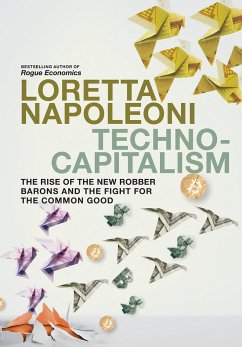A fascinating look at how the Space Barons and Techtitans heads of companies like Uber, Amazon, Tesla have hijacked technology, preventing it from being used on behalf of the common good and profiting from the politics of fear and consumerism.
The respected Italian economist and journalist offers a bold and provocative argument that the speed of technological transformation is threatening our future
At the dawn of the digital revolution, the internet was going to be the great equalizer, a global democratic force. Instead, with the money printed electronically to bail out banks, Wall Street ended up funding a new breed of serial capitalists, the Techtitans, who embraced rapid, transformational change while stripping their workers of rights and enriching themselves beyond anybody's wildest imagination; and the Space Barons, who mine new frontiers for precious resources. Then came the gig-economy, another supposed digital equalizer, where everybody was his or her own boss, but it was just another illusion.
Tech pioneers like Google, Facebook, Apple, Uber, and Microsoft never had any intention of spreading democracy. Those who control and own the technology are the absolute masters. As artificial intelligence enters the labor market, companies like Uber are able to cut labor costs to the barest of minimums, by squeezing workers privileges and rights.
In Technocapitalism, Napoleoni describes these phenomena as the genesis of a new paradigm, born in a period of extraordinary change in which the acceleration of transformational change has caused a dizzying, anxiety-induced paralysis from the FTX collapse to AI, private space companies to the war in Ukraine, from inflation to the dirty environmental truth of EV car batteries. Technological transformation is occurring at a speed that is existentially unbearable for most of us. We must fight for our common good to address today's real challenges of global warming and militarism and thesoulessness of capitalist endeavor. Napoleoni shows us how.
The respected Italian economist and journalist offers a bold and provocative argument that the speed of technological transformation is threatening our future
At the dawn of the digital revolution, the internet was going to be the great equalizer, a global democratic force. Instead, with the money printed electronically to bail out banks, Wall Street ended up funding a new breed of serial capitalists, the Techtitans, who embraced rapid, transformational change while stripping their workers of rights and enriching themselves beyond anybody's wildest imagination; and the Space Barons, who mine new frontiers for precious resources. Then came the gig-economy, another supposed digital equalizer, where everybody was his or her own boss, but it was just another illusion.
Tech pioneers like Google, Facebook, Apple, Uber, and Microsoft never had any intention of spreading democracy. Those who control and own the technology are the absolute masters. As artificial intelligence enters the labor market, companies like Uber are able to cut labor costs to the barest of minimums, by squeezing workers privileges and rights.
In Technocapitalism, Napoleoni describes these phenomena as the genesis of a new paradigm, born in a period of extraordinary change in which the acceleration of transformational change has caused a dizzying, anxiety-induced paralysis from the FTX collapse to AI, private space companies to the war in Ukraine, from inflation to the dirty environmental truth of EV car batteries. Technological transformation is occurring at a speed that is existentially unbearable for most of us. We must fight for our common good to address today's real challenges of global warming and militarism and thesoulessness of capitalist endeavor. Napoleoni shows us how.
"The author of Rogue Economics warns us that 'high-tech-savvy entrepreneurs' are monopolizing the economy, exacerbating inequality, weakening the state, and placing 'the common good in jeopardy.' . . . her argument is well documented and addresses the real threat that the economy s financialization poses to democratic institutions and personal freedom. We are, she claims, 'sleepwalking towards dystopia.' A heartfelt plea for greater vigilance in a world increasingly controlled by advanced digital technology." --Kirkus Reviews








